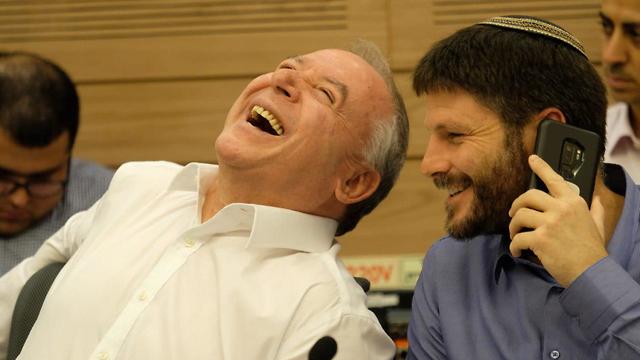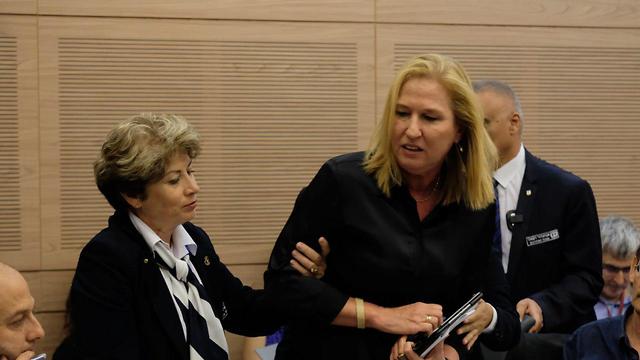
Deputy AG, Knesset legal advisor come out against nationality bill
During Knesset committee discussion about the controversial legislation, Deputy AG Raz Nizri and Knesset legal advisor Eyal Yinon warn of the international repercussions to the legislation, particularly over article 7b, which allows the exclusion of citizens from cities and towns based on their nationality or religion.
The Knesset's legal advisor, Eyal Yinon, and Deputy Attorney General Raz Nizri came out against the controversial nationality bill, which is set to go up to a second and third reading in the Knesset next week, warning Tuesday that it could draw international criticism.
During a a joint discussion of the Knesset's House Committee and the Constitution, Law and Justice Committee, Yinon expressed his opposition to article 7b of the bill, which would allow religious or national groups to establish communities that could exclude others.
Explaining the problematic nature of the article, Yinon told MKs that "As long as you don't have a sweeping ban on accepting (to the community) a citizen (of a certain group), that's okay. When you build a Jewish community, and you bring in populations that aren't Jewish, it doesn't turn the community into non-Jewish."
In his legal opinion, Yinon noted article 7b "significantly deviates from the delicate balances required in this context. This article could stain the important Basic Law (the nationality bill) which seeks to enshrine into law, for the first time in a detailed manner, the identity and character of the state as the nation state of the Jewish people. This article could also lead to precedential judicial interference in the Knesset's legislation of Basic Laws."
He recommended the committee to consider adopting alternative wording for article 7b, "which allows the establishment of a separate community with a social and cultural designation, but it would not be possible to exclude citizens from it in a sweeping manner based on their nationality, religion, sexual orientation or other characteristics, as long as their acceptance will not hurt the social and cultural nature of the community."
Nizri defined article 7b as "the most significant problem" in the legislation. He said other articles in the proposal dealing with the nationalistic aspect are not discriminatory, while article 7b "stands out in its irregularity."
"This is a personal discrimination against a citizen based solely on his nationality. It's not just Jewish," Nizri explained. "Article 7b talks about the individual citizen. It discriminates against him."
"We brought up our objection to certain articles in the early stages" of the legislative process, Nizri added. "We don't need a situation in which only the left-wing supports a democratic state, while only the right wing supports a Jewish state. This is a value that's enshrined in our basic laws and keeps us here, and it's a shame the Jewish state belongs only to the right-wing and the democratic state belongs only to the left-wing. Try to break away from this."
Nizri also pointed to another issue with the legislation, the status of the Arabic language. "It would've been better if in this bill the treatment of the Arabic language would not change as they want to change it," he said.
He clarified, however, that "I don't forget for a moment that you are the sovereign, and I'm here as a representative trying to convince you not to cause damage."
Even before the discussion began, Yesh Atid MK Pnina Tamano-Shata yelled at Bayit Yehudi MK Bezalel Smotrich and Likud MK David Amsalem that the proposal "is pure racism. A disgrace."
The two responded to her: "It's not racism, it's Zionism."
In a letter sent to Prime Minister Benjamin Netanyahu, Knesset Speaker Yuli Edelstein and the committee's chairman and members, President Reuven Rivlin also came out again article 7b, expressing concern it could hurt the Jewish people, Jewish around the world and the State of Israel.
He warned against giving legal approval to establishing communities "without Mizrahi Jews, without Haredim, without Druze, without LGBT. Is this the meaning of the Zionist vision?"
MK Amir Ohana (Likud) slammed President Rivlin, saying, "When I read the president's letter, I don't know if it's President Rivlin or politician Rivlin speaking."
Opposition MKs attacked Ohana for his comment, with Yesh Atid MK Elazar Stern asking Ohana to apologize for his comments, a request the latter refused.
Zionist Union MK Tzipi Livni was removed from the discussion over her criticism of Ohana.
After being removed from the discussion, Livni accused Ohana, the committee's chairman, of "exploiting his role to attack the president, to try to claim he was being a politician. But the president represents in his letter the values of the State of Israel, the Declaration of Independence and all of the fathers of Zionism - who have long been forgotten by the Likud and this coalition."
Speaking to Ynet, she warned that under the nationality bill, "Jews will once again be living in communities in which Arabs will not be allowed to live."
Ohana, she added "who represents the gay and lesbian community, could under the law be barred from a straight people's community."
MK Pnina Tamano-Shata, "who represents the Ethiopian community in the Knesset, will perhaps not be able to live in a community that doesn't want to have Ethiopians. (Coalition chairman) David Amsalem, who is defending the government, could be excluded tomorrow from a community that doesn't want Mizrahi Jews," Livni went on to explain.
This discussion, she said, is "not about one article or another. It's about a government that not only divides us into tribes. This is how the Israeli government wants to see the State of Israel. We'll fight this, with strength."
Likud MK Miki Zohar also criticized the president, saying "I think what President Rivlin is doing is another one of his repeat attempts to find favor with all Israeli citizens, while he forgets his basic DNA. He thinks coming out against almost every move by Israel's prime minister and the right wing serves his public image."
The amended version of the legislation was published on Thursday. To pass the legislation into law, the coalition will need a 61 MK majority. To that end, coalition MKs are not allowed to be absent from the Knesset until the end of next week—the last week of the Knesset's summer session.
 |
Attila Somfalvi, Alexandra Lukash contributed to this story.













